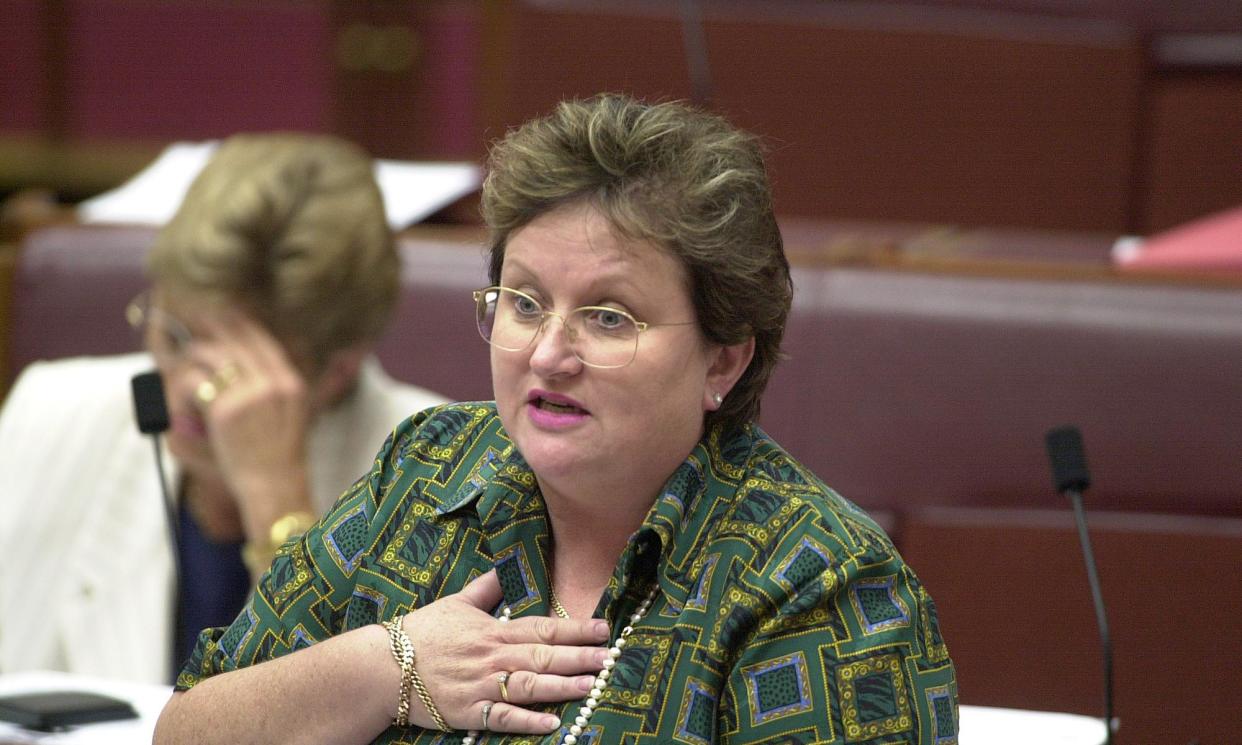Australian politics needs fewer ‘vaguely incompetent men’, Amanda Vanstone says, not gender quotas

Amanda Vanstone is opposed to quotas for women in politics. Her solution to increasing women’s participation is to tackle the problem the other way around: focus on the men.
“Talented women don’t always make it,” Vanstone told Guardian Australia on Monday. “Vaguely incompetent men frequently make it but vaguely incompetent women never do.”
The former Howard government minister believes the way to increase political participation by high-quality women – including in her own party – is to decrease the number of lower-quality men.
“I think the trick to fix it is not to put more average women in, but to put in fewer average men,” she said, adding: “You hit two jackpots. You get rid of the vaguely incompetent men and you get more women.”
Vanstone’s advice comes as the prime minister, Anthony Albanese, marks 30 years of the Labor party’s affirmative-action rule that imposed quotas for women by offering the Liberal party some advice of his own.
“True to character, the Liberals mocked affirmative action when we introduced it and they mock it now,” Albanese said in a speech in Labor’s caucus room on Monday evening marking the 26 September anniversary of the 1994 rule that initially required 35% of winnable seats to go to female candidates by 2002. “They did not see a case for intervening to accelerate a process that had been so painfully incremental.”
Lauding Labor’s 52.4% female federal Labor caucus, Albanese accused the Liberals of a “woeful” comparative performance and “an embarrassingly lopsided party room”, with women making up 29.4% of Coalition parliamentarians.
“With no commitment to advancing women in their ranks, they took no action at all, assuming things would somehow work out,” he said.
He did not compare numbers on the respective frontbenches. The government has 14 women in the combined cabinet and outer ministry, the opposition 15.
The retiring former Liberal minister Karen Andrews spoke out in favour of quotas on Monday, the former opponent of quotas telling the House of Representatives that she had changed her mind.
“I have always been opposed to quotas because I have never wanted to be considered to have been appointed into a role for anything other than my ability to do the job,” Andrews said. “What I have seen over the last decade at least has made me soften my views to opposing quotas.”
Andrews said more work needed to be done to promote parliament as a desirable workplace and “a welcoming place for women”.
“I look at this side of the house and I look at the female representation that we have here and I am absolutely convinced that we need to do better,” she said.
In a remark that drew laughter from others in the chamber, she cast doubt on the merit arguments often wielded against quotas.
“Historically we have always been of the view that you get preselected based on merit,” Andrews said. “But sometimes you look around and you think ‘well maybe merit only applies in certain circumstances’ and that basically merit and the appointment of people on merit is often used to stop women progressing.”
The former home affairs minister, who will retire at the next election, has called for changes to preselection processes to encourage more women. The Queensland Liberal National party selected a foreign investment lawyer, Leon Rebello, to replace her in the Gold Coast seat of McPherson in a contest that involved three men.
“If we want to make change here, we cannot simply cross our fingers and hope that things are going to change unless we take positive action because doing that in the past has been an abject failure,” Andrews said.
Related: The Liberal party does not have a ‘women problem’. Men are the problem | Amy Remeikis
A spokesperson for the opposition leader, Peter Dutton, said he remained opposed to quotas and had spoken previously of the Liberals’ need to work harder to recruit and support women who would like to move into politics.
Vanstone also believes preselections need to change and says the Liberal party should consult past election results – especially the election after its landslide in 1996 – for guidance.
“If you looked at the [1996] seats and then looked at the ones we lost [in 1998], a lot of the seats on low margins were kept because we had female candidates,” Vanstone said. “Now that’s the sort of thing that should be fed to preselectors.”
The former minister’s views on gender and quality candidates hark back decades.
In a speech 22 years ago to mark the centenary of suffrage for some women in Australia, she declared there would only be equality in politics when there were as many useless women as useless men.
“Each of us, just for a moment … should think of the least useful MP we possibly can,” Vanstone said in 2002. “Let me assure you of something: that when you get a woman as ineffective, that’s when we’ll have real equality.”


